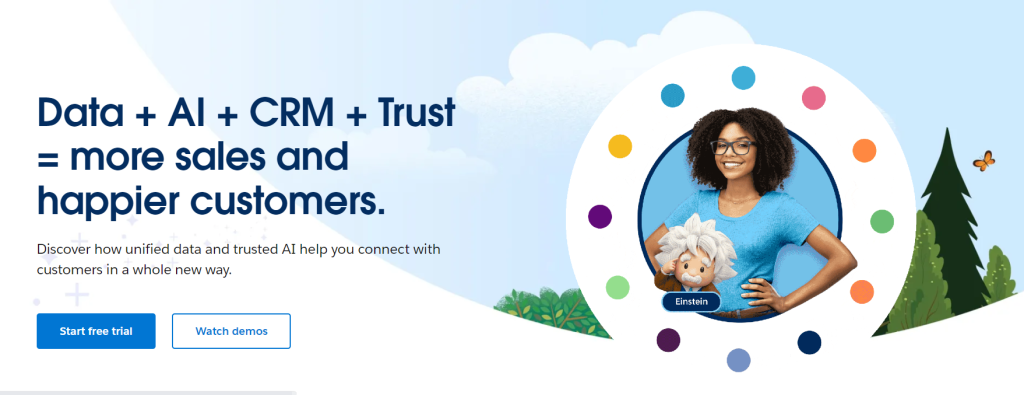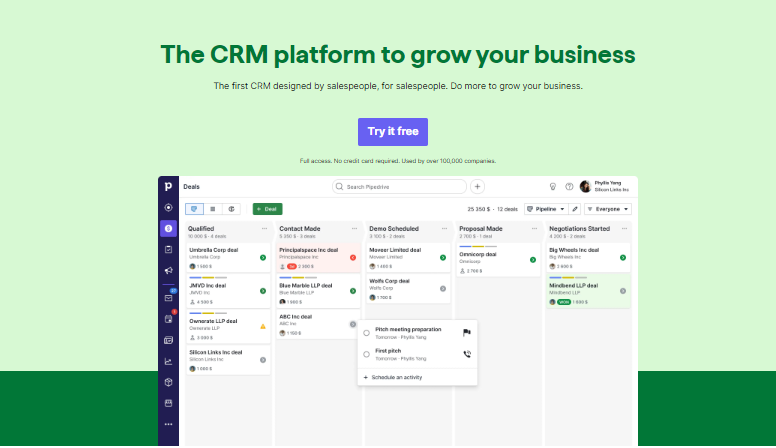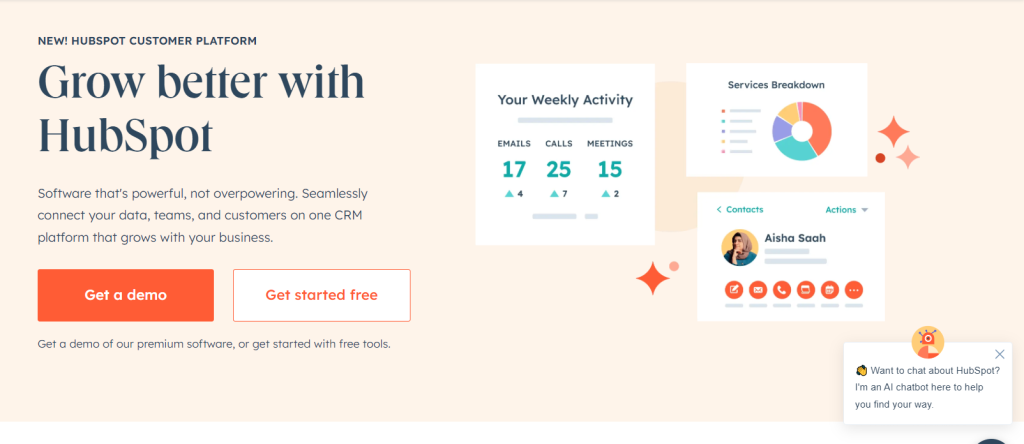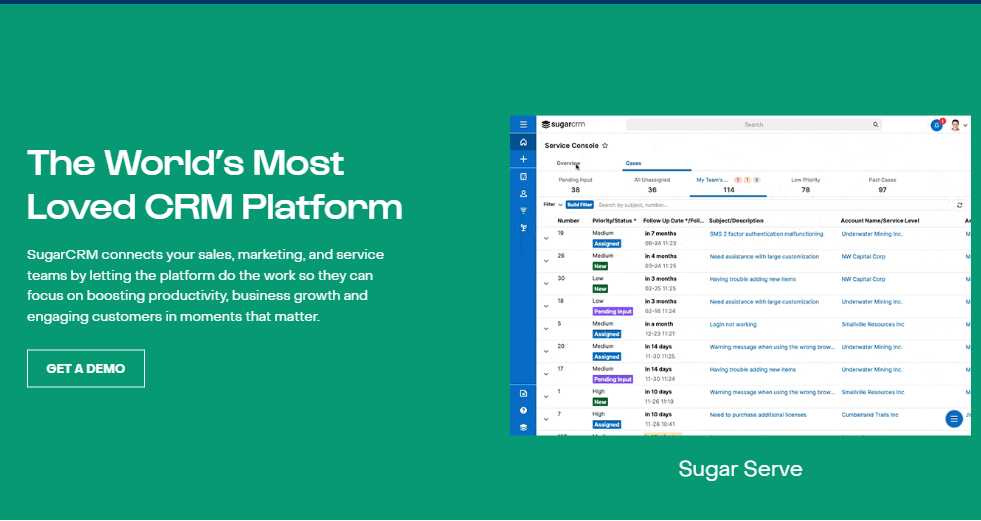Top 10 Reasons Why Your Business Needs A CRM Web Portal

A Customer Relationship Management portal or a CRM web portal is a productive tool that creates growth opportunities for businesses. It encompasses a blend of cutting-edge technologies, all strategically designed to help businesses manage and optimize their interactions with customers.
In this guide, we will discuss what a CRM web portal is, its different types and a compelling list of ten reasons why your business can significantly benefit from implementing a CRM web portal into your operations.

What Is A CRM System?
A Customer Relationship Management (CRM) system is a technology platform or software application that businesses use to manage and analyze their interactions and relationships with customers and potential customers.
The primary purpose of a CRM system is to improve and streamline customer relationship management, enhance customer satisfaction, and ultimately drive sales and business growth.
The Different Types Of Industry-Specific CRM Portals
Industry-specific CRM solutions are built to meet the challenges of various sectors. These CRM systems provide specialized functionality designed to streamline industry-specific processes.
Here are a variety of industry-specific CRM portals:
1. Healthcare CRM
This CRM solution is designed to manage patient relationships, medical records, appointments, and compliance with healthcare regulations.
2. Retail CRM
Retail businesses benefit from CRM systems that focus on customer segmentation, loyalty programs, inventory management, and e-commerce integration.
Retail CRMs help businesses understand customer buying patterns leading to improved customer engagement in the process.
3. Financial Services CRM
In the financial industry, CRM solutions manage client accounts, financial planning, and regulatory compliance. These CRMs also improve client relationships and structure financial advisory services.
4. Hospitality CRM
The hospitality sector relies on CRM systems to manage guest reservations, loyalty programs, and personalized guest experiences.
5.Real Estate CRM
Real estate professionals use CRM solutions to maintain property management, lead generation, and client communication.
6. Automotive CRM
Automotive dealerships utilize CRM systems to track leads, manage inventory, and provide personalized customer service.
Ready to create your own CRM web portals?
HOI Solutions has a team of industry experts who have experience working on 233+ projects with clients globally.
7. Legal CRM
Law firms and legal professionals benefit from CRM solutions that manage client relationships, case histories, and billing. Legal CRMs also assist attorneys in improving case management.
8. Manufacturing CRM
Manufacturers use CRM systems to align supply chain management, customer orders, and production scheduling.
9. Nonprofit CRM
Nonprofit organizations rely on CRM solutions to manage donor relationships, fundraising campaigns, and volunteer coordination.
10. Higher Education CRM
Educational institutions utilize CRM systems to manage student admissions, enrollment, and academic advising.
11. Insurance CRM
Insurance companies benefit from CRM solutions that track policyholders, claims processing, and underwriting.
12. Travel and Tourism CRM
The travel and tourism industry relies on CRM systems to manage bookings, customer preferences, and loyalty programs.

Reasons Why Your Business Needs A CRM Web Portal To Grow
A Customer Relationship Management web portal can bring numerous benefits to your business. Here are the top 10 reasons why your business needs a CRM web portal:
1. Centralized Customer Information
A CRM web portal provides a single platform for managing customer-related information, including contact details, communication history, and purchase history.
Furthermore, CRM portals also make it easier for sales and customer service teams to access the information they need to make informed decisions. It allows businesses to:
- Save time that would otherwise be spent searching through disparate systems and spreadsheets.
- Personalize interactions, addressing specific needs and concerns.
- Facilitate data analysis, helping you identify trends and opportunities for improvement.
- Collaborate easily when they have access to the same customer information.
For example: If a customer calls in with a question about a product they purchased, a customer service representative can quickly access their purchase history and previous communications through the CRM to provide efficient customer support.
2. Enhanced Sales Tracking
A CRM software platform offers sales tracking capabilities that can enhance the way your sales teams operate. Similarly, this web portal also provides a comprehensive view of your sales pipeline, customer interactions, and historical data. It allows businesses to:
- Gain a real-time view of your sales pipeline, identifying opportunities and potential roadblocks.
- Equip your sales team with insights, allowing them to prioritize leads and allocate resources.
- Foster communication between sales representatives, ensuring everyone is on the same page regarding client interactions.
- Access data analytics to identify sales trends, customer preferences, and areas for improvement.
- Make accurate sales forecasts based on historical data and current opportunities.
For example: Your sales team is pursuing a potential client. With CRM, they can quickly check the prospect’s history, see which products or services they’ve expressed interest in, and review past communications. This information assists your sales team in tailoring their pitch effectively, increasing the chances of closing the deal.

3. Better Customer Service
An online CRM system is crucial for improving customer service in addition to being a tool for sales teams. It equips your customer service agents with the knowledge and CRM web portal resources they need to deliver excellent service. It allows businesses to:
- Resolve customer issues faster and with greater accuracy by having access to their complete history.
- Delight customers with personalized responses and solutions tailored to their needs and preferences.
- Keep track of customer interactions, ensuring consistent and effective communication.
- Foster customer loyalty and increase the likelihood of repeat business.
- Gain valuable insights into customer behavior and preferences to refine your service offerings.
For example: A customer calls your support team with an urgent issue. With CRM, your support representative can access the customer’s history, including past inquiries, purchases, and preferences, instantly. This enables them to address the issue promptly offering personalized solutions, leaving the customer satisfied.
4. More Accurate Forecasting
Accurate sales forecasting is necessary for businesses aiming to make informed decisions and plan their strategy accordingly. That’s why a CRM web portal plays a pivotal role in providing the data needed for precise forecasting. It allows businesses to:
- Leverage historical customer data and trends to make predictions about future sales, demand, and market trends.
- Allocate resources, inventory, and staffing based on accurate forecasts, improving efficiency.
- Stay ahead of competitors by meeting customer demands first.
For example: A healthcare provider might use a CRM system to track patient data. By analyzing historical patient records and trends, they can accurately predict future demand for specific services. Through the CRM web portal, the provider can allocate resources, offer timely services, and maintain patient satisfaction.
5. Improved Marketing Effectiveness
Effective marketing is the core of any business. A CRM web portal can improve your marketing efforts by providing valuable tools to create targeted campaigns. It allows businesses to:
- Divide your customer base into distinct segments for personalized marketing campaigns.
- Craft marketing messages that resonate with each segment, resulting in higher conversion rates.
- Automate lead nurturing processes to guide prospects through the sales funnel.
- Monitor the performance of marketing campaigns in real-time and make adjustments as needed.
- Leverage customer data and analytics to refine marketing strategies.
- Track the return on investment (ROI) of marketing efforts to optimize budget allocation.
For example: An e-commerce store is looking to launch a new product line. With CRM, they can segment their customer database based on past purchase behavior, preferences, and demographics. This allows them to customize your marketing messages and promotions specifically to each customer segment.
6. Streamlined Sales Process
Efficiency in the sales process is key to maximizing revenue and minimizing operational costs. A CRM web portal streamlines your sales process, making it more organized and structured. It allows businesses to:
- Implement automated workflows for tasks such as lead nurturing, email follow-ups, and proposal generation.
- Gain a clear view of your sales pipeline, identifying bottlenecks and opportunities for improvement.
- Foster collaboration among sales team members, sharing insights and strategies.
- Minimize administrative work, allowing your sales team to focus on the most important tasks.
For example: Your sales team is managing leads from various sources—emails, website inquiries, and phone calls. With CRM, all leads are consolidated into a single database. Furthermore, automated lead assignment ensures that each lead is promptly assigned to the right sales representative based on predefined criteria.
7. Better CRM Data Management
Data is the engine that runs modern businesses; that need advanced data management for making critical business decisions. A CRM web portal aligns your data management, creating access to accurate and organized information whenever they need it. It allows businesses to:
- Store all customer data in one secure location, eliminating data silos.
- Check data accuracy, consistency, and integrity through automated data validation and cleaning processes.
- Implement robust data security measures to protect sensitive customer information.
- Adjust your CRM to capture and manage specific data points relevant to your business.
- Verify compliance with data protection regulations, such as GDPR and CCPA.
- Leverage clean and reliable data for accurate reporting and actionable insights.
For example: You are running a retail business with multiple locations. With CRM, you can centralize customer data, purchase history, and inventory information across all stores. Through this, your teams have access to up-to-date information, which assists in inventory management, and customer service.
8. Improved Collaboration
Collaboration is the cornerstone of effective teamwork within any organization. A CRM web portal fosters improved collaboration among teams, breaking down communication barriers and enhancing productivity. It allows businesses to:
- Break down silos by providing different departments with access to shared customer information.
- Keep everyone informed with real-time updates on customer interactions and sales progress.
- Share marketing materials, proposals, and sales collateral with ease.
- Facilitate communication through integrated messaging and comment threads within CRM.
For example: Your marketing and sales teams need to coordinate efforts for a product launch. With CRM, both teams have access to the same customer data, allowing them to align their strategies and messaging. Both teams can also collaborate effectively on lead nurturing, campaign targeting, and follow-up, resulting in a more coordinated launch.
9. Enhanced Customer Retention
Customer retention is as important as acquiring new customers, if not more so. A CRM web portal improves customer retention by helping you nurture and maintain long-lasting relationships. It allows businesses to:
- Send targeted communications, offers, and recommendations that resonate with each customer’s preferences.
- Automate follow-up emails and notifications so that customers receive timely support and assistance.
- Gather and analyze customer feedback to identify areas for improvement and address concerns proactively.
- Implement loyalty programs and rewards to incentivize repeat business.
- Use predictive analytics to identify at-risk customers and take preventive measures to retain them.
For example: If a customer hasn’t made a purchase in a while. CRM can trigger automated email campaigns, offering personalized recommendations and exclusive offers based on their past preferences and behavior. This re-engagement strategy can bring back inactive customers and keep them loyal to your brand.
10. Increased Revenue
Ultimately, the goal of any business is to increase revenue and profitability. A CRM web portal can be a significant driver of revenue growth by optimizing various aspects of your operations. It allows businesses to:
- Identify and capitalize on opportunities to sell additional products or services to existing customers.
- Retain more customers increasing the lifetime value of each customer.
- Streamline the sales process, reducing the time it takes to close deals.
- Enhance sales and lead management and lead nurturing processes to convert more leads into paying customers.
For example: Your company can leverage CRM to identify upsell and cross-sell opportunities among its existing customer base. By analyzing purchase history and customer preferences, they can target specific offers to customers who are likely to make additional purchases. This strategy can lead to a surge in sales without the need for extensive marketing efforts.
Ready to create your own CRM web portals?
HOI Solutions has a team of industry experts who have experience working on 233+ projects with clients globally.
Choosing The Right CRM Solution
With numerous CRM options available in the market, finding the perfect fit for your organization can be a daunting task. However, by following a structured approach, you can make an informed choice.
Here’s a guide on how to pick the right CRM solution for your business:
1. Define Your Business Goals and Needs
Begin by clearly defining your business goals and the specific needs you expect a CRM web portal system to address. Consider factors such as:
- The size of your customer base
- The complexity of your sales and marketing processes
- The need for automation
- Integration requirements with existing systems
Having a clear understanding of your objectives will help you narrow down CRM systems that align with your requirements.
2. Assess Scalability
Your business is likely to grow over time, so choose a CRM solution that can scale alongside your organization. Furthermore, the CRM system you select should accommodate an increasing volume of data, users, and customer interactions without a significant overhaul.
3. Budget Considerations
Establish a budget for your CRM project, taking into account not only the initial implementation costs but also ongoing expenses, including user licenses and support fees.
4. Determine User Requirements
Identify who will be using the CRM web portal within your company. Different teams may have varying needs, such as sales, marketing, customer support, and management. So, check if the CRM you choose caters to the specific requirements of each user group.

5. CRM Integration Capabilities
Consider the CRM system’s ability to integrate with other tools your business relies on. These tools include the likes of email marketing platforms, accounting software, and e-commerce platforms.
6. Mobile Accessibility
Having a CRM web portal that offers mobile accessibility is vital. That’s why the CRM solution you purchase should provide mobile apps or responsive web access for users on the go.
7. CRM Web Portal Security and Compliance
Protecting customer data is a top priority for all businesses. Verify that the CRM solution adheres to data security best practices and complies with relevant regulations, such as GDPR or HIPAA, depending on your industry.
8. CRM User Training and Support
Consider the availability of user training and support resources offered by the CRM vendor. Adequate training ensures that your team can maximize the system’s capabilities, and responsive support can help address any issues promptly.
9. Trial and Testing
Whenever possible, take advantage of free trials or demos offered by CRM vendors. This hands-on experience will allow you to assess whether the CRM solution fits your requirements or not.
10. User Feedback and Reviews
Research user reviews and seek feedback from businesses in your industry that have implemented the CRM systems you’re considering. This feedback from other businesses can provide you with valuable insights before you make a purchase.
11. Vendor Reputation
Evaluate the reputation and track record of the CRM vendor you are considering. A reliable vendor is more likely to provide ongoing support and updates, increasing the longevity of your CRM investment.
12. Customization In CRM Portals
Verify whether the CRM solution allows for customization to tailor it to your specific business processes and branding.
13. Return on Investment (ROI)
Calculate the potential return on investment that the CRM system can deliver. Will it help increase revenue, improve customer satisfaction, or streamline operations in a way that justifies the investment?
Ready to create a dynamic CRM web portal?
HOI Solutions lets you experience the power of data-driven customer insights with a custom CRM web portal.
Conclusion
A well-chosen CRM website serves as a compass that directs companies toward growth and success. It strengthens customer relationships, streamlines operations, and creates opportunities for revenue growth. When picking a CRM system, keep in mind that we are your reliable CRM web portal development partner.
HOI Solutions has the skill to develop customized solutions that meet your specific demands, industry-specific constraints, and future scalability distinguishes us. You’re not simply investing in technology when you choose us; you’re investing in a long-term collaboration dedicated to helping your company prosper in the digital age.


